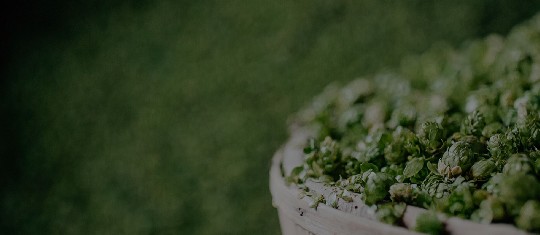Hello and welcome to the BarthHaas August HopUpdate! In addition to the current crop status, this month we will also take a special look at organic hop cultivation. To do so, we will visit the organic farm of the Pichlmaier family, located in the eastern part of the Hallertau region. We will visit a hop yard of the variety Mandarina Bavaria, this variety is widely used in organic hop cultivation.
Not every hop variety is suitable for organic hop cultivation. Especially the high alpha varieties, which are of great importance in the conventional sector, are hardly cultivated in organic farming because they are simply too susceptible to disease and pests. Organic growers are very limited in terms of plant protection and fertilization. Therefore, the choice of varieties in organic cultivation is consistently based on sustainability criteria and site adaptation.
If we look at the general condition of the plants, then unfortunately the same can be said about both the conventional and the organic stocks, and that is that they are all underperforming.
In particular, sensitive varieties, such as Halltertauer Tradition, Perle, and Saphir suffered the most. The high alpha varieties show a more vigorous habitus than the susceptible varieties, but lower levels of alpha acid are still expected.
Developmental stages range across all varieties from BBCH 85 to BBCH 89, meaning advanced maturity to picking maturity. This puts vegetation overall about a week ahead of the long-term average. This is a trend that was already apparent in the spring and has continued to date.
This general critical condition of the plants is due to the persistent hot and very dry weather coupled with very strong winds, which have virtually dried out the stocks like a Hair dryer.
Even irrigated sites struggled greatly with the dry winds and many hot days. Rainfall totals were also well below the long-term average in August. And what is particularly problematic is that the precipitation is not well distributed and area-wide, but is occurring more and more frequently as very localized heavy precipitation. This precipitation cannot then be absorbed by the soil in the short time and can also cause damage to crops if it occurs as a hail or thunderstorm.
Such stressed and weakened crops are naturally susceptible to diseases and pests. Typical for hot years, this year is the infestation pressure with the common spider mite. Both in conventional and organic crops. In the conventional farms, multiple treatments with chemical crop protection were necessary due to the heavy infestation. Unfortunately, only a limited number of approved active ingredients are available to these growers and this year there was even a shortage in the amount of active agents produced, so not all growers were able to meet their needs.
Organic growers have agents that are specifically approved for organic growing. These agents have a purely infestation-reducing effect. This means for the organic growers blanket and preventive spraying is not the means of choice. Intensive and regular crop monitoring is crucial in order to then find the optimal time for application.
Successful treatment of spider mite in organic is only possible if the optimal time of application is observed.
A meanwhile massive problem is the flea beetle. It can be found in conventional and organic crops all over the country and has meanwhile taken over a yield-reducing population. Already in spring, it attacks the fresh shoot tips, eats them off and thus inhibits growth.
Flea beetles sometimes eat the leaves down to the leaf veins and then move onto the cones as well. The conventional growers do not have an active ingredient that would be approved for use at this time. Organic growers have no proven biological agent at all with which to defend against the pest.
This year, fungal diseases were very well controlled and at the moment the last final treatments are underway, with a focus on powdery mildew.
All in all, unfortunately, August did not bring the desired recovery for the hops either. The challenges of this hot and dry year have only intensified. Therefore, below average yields and alphas are expected. Harvest is just around the corner and we will take you along with us in our next HopUpdate in September. Until then!


